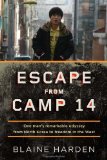 Shin Dong-hyuk was born and bred to be a slave. His father, imprisoned for the crimes (i.e. defection) of his brother, was given a “reward marriage” and allowed to spend 5 nights a year with his wife by the camp guards. Other than that, sexual contact was forbidden and punished by execution. Shin was born in Camp 14 in North Korea, a gulag that defies imagination and that has existed far longer than the gulags of Stalin or Hitler’s death camps. There live people punished for life because they are relatives of someone who defected from North Korea, or the children of those relatives, under a 1972 ruling that decrees “enemies…their seed must be eliminated through three generations.” (p. 6)
Shin Dong-hyuk was born and bred to be a slave. His father, imprisoned for the crimes (i.e. defection) of his brother, was given a “reward marriage” and allowed to spend 5 nights a year with his wife by the camp guards. Other than that, sexual contact was forbidden and punished by execution. Shin was born in Camp 14 in North Korea, a gulag that defies imagination and that has existed far longer than the gulags of Stalin or Hitler’s death camps. There live people punished for life because they are relatives of someone who defected from North Korea, or the children of those relatives, under a 1972 ruling that decrees “enemies…their seed must be eliminated through three generations.” (p. 6)
He grew up in a world in which concepts such as love, mercy, forgiveness, and God did not exist. He watched a six-year-old classmate beaten to death because she had stolen 5 grains of corn, and he viewed that as normal and justifiable. His mother was viewed as a competitor for food; before he started school, he would be hungry and eat her lunch, and she would beat him brutally when she came home.
At school, he learned the rudiments of reading and writing, but most importantly he learned the 10 Rules of the Camp. While he was still a child, he began to work full-time doing hard labor—coal mines, factory work, feeding pigs. Camp 14 is nearly entirely self-sufficient except for salt, and the labor is provided by the inmates, who can be mistreated, abused, tortured and executed at the guards’ whim. Thanks to their livelihood and chronic malnutrition, not to mention a complete lack of medicine and basic hygiene, most die in their 40s or 50s.
When Shin was 13, he overheard his mother plotting to escape with his brother. He turned them in, as he had been raised to do. The guard that he told took credit for the information, and Shin and his father were taken to an underground prison where they were brutally tortured. Eventually, he managed to convince the guards that he had actually been the one to snitch on his family. He was then left alone in the care of an older inmate, a man he called “Uncle.” Uncle was the first to even tell the young Shin that a world existed outside of the camps. He mentioned food. To Shin, food was hands-down the most important issue of life. He’d never not been hungry.
He was released to watch the executions of his mother and brother.
Years later, in his early 20s, he was assigned to report on an older newly-arrived prisoner during their work at a sewing factory. The prisoner talked of food. And Shin made what journalist Blaine Harden calls “the first free choice of his life.” He decided not to report on his new friend. Instead, the two hatched a daring and ill-conceived idea—they would escape, although Shin had only the haziest idea of what the world outside the camp was like, knowing nothing of politics or money or history or geography. “Freedom, in Shin’s mind, was just another word for grilled meat.” (p 99)
Shin ends up being the only one who escapes, and he has no idea what to do. He manages to make his way eventually to China and then on to South Korea, and then the U.S. The description of his life in a free country is painful. He struggles with tremendous guilt and shuns happiness—how can he be happy when so many others are dead or still imprisoned? “’I escaped physically,’ he says. ‘I haven’t escaped psychologically.’” (p.190)
Journalist Blaine Harden spent hours meeting with Shin and working together to tell his story. (They’re splitting the royalties 50-50) In addition to being Shin’s biography, Escape from Camp 14 includes information on North Korea and brief accounts of others who’ve escaped from the brutal regime. It’s a really disturbing book but I think it’s very important, too. There are tens of thousands of people in those camps today, camps whose existence is denied by the North Korean government but which are clearly visible by satellite and even on Google Earth. As Harden points out, we all know about the Nazi death camps, and we consider books such as Elie Wiesel’s Night
or Anne Frank: The Diary of a Young Girl
to be necessary reading. But Escape from Camp 14
isn’t about historical fact—it’s about current reality.
Elizabeth and her family (including 3 teens) went to hear Blaine Harden speak last week at a local bookstore. Powerful stuff. Learn more at her blog Planet Nomad.
Wow. That sounds like a difficult, but fascinating, read.
Jessica, it really is. It’s also a fairly quick read. I had my 3 teens read it, because I feel it’s important to know what’s going on.
This sounds like an amazing read. Adding it to much summer reading list!
What an incredible book – and an incredible story. Definitely does sound like a difficult read, but at the same time a book that must be read. Thanks for sharing it!
I so want to read this book! Thanks for the review!
I so want to read this book – thanks for the review!